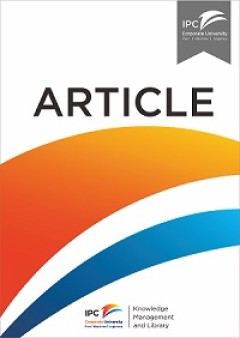Ditapis dengan

World-class logistics- Australia and New Zealand
This paper reports on a study of the logistics and supply chain practices of Australian and New Zealand firms.
- Edisi
- Vol. 35 No. 1, 2005 pp. 63-74
- ISBN/ISSN
- 0960-0035
- Deskripsi Fisik
- 14 p .
- Judul Seri
- International Journal of Physical Distribution & Logistics Management
- No. Panggil
- ATC LO MOL w

Employability and talent management: challenges for HRD practices
The purpose of this conceptual paper is to illuminate the problems that are associated with defining and identifying talent and to discuss the development of talent as a contributor to employability.
- Edisi
- Vol. 36 No. 1, 2012 pp. 26-45
- ISBN/ISSN
- V
- Deskripsi Fisik
- 22 p.
- Judul Seri
- European Journal of Training and Development
- No. Panggil
- TXT LE NIL e C.1

An empirical analysis of core competence for high-tech firms and traditional …
The main purposes of this paper are as follows. Exploring whether there is significant difference in the model of core competence between H-T firms and T-Ms in Taiwan. Investigating whether there is significant difference in the explanatory power of dimensions of core competence both for H-T firms and T-Ms in Taiwan.
- Edisi
- Vol. 26 No. 2, 2007 pp. 159-168
- ISBN/ISSN
- -
- Deskripsi Fisik
- 12 p.
- Judul Seri
- Journal of Management Development
- No. Panggil
- ATC LO CHI a

Specific competencies in humanitarian logistics education
The purpose of the research paper is to provide the humanitarian logistics community with an overall picture about competencies and skills in humanitarian logistics and if there is a lack of professionalization of the logistics function in humanitarian context from an international perspective. Further this research elaborates practical approaches how the skills and competencies can be enhanced…
- Edisi
- Vol. 3 Issue: 2, pp.99-128
- ISBN/ISSN
- -
- Deskripsi Fisik
- 32 p.
- Judul Seri
- Journal of Humanitarian Logistics and Supply Chain Management
- No. Panggil
- ATC LO ABI s

From task-based to competency-based : a typology and process supporting a cri…
Organizational effectiveness today depends largely on the ability to activate, share and transform the intellectual capital of the company into sustainable and difficult-to-imitate competitive advantage. This paper seeks to develop a competency typology that integrates previous definitions and frameworks from the literature and to propose a methodology for identifying competencies to aid the …
- Edisi
- Vol. 39 No. 3, 2010 pp. 325-346
- ISBN/ISSN
- 0048-3486
- Deskripsi Fisik
- 24 p.
- Judul Seri
- Personnel Review
- No. Panggil
- ATC MG SOD f

Marketing in governance : emotional intelligence leadership for effective cor…
The purpose of this paper is to examine the most generally applied definitions and other aspects of emotional intelligence, as well as its associated managerial leadership competencies in corporate governance.
- Edisi
- N. Gladson Nwokah Augustine
- ISBN/ISSN
- -
- Deskripsi Fisik
- 15 p.
- Judul Seri
- -
- No. Panggil
- ATC LE NWO m

Information technology influences on world class logistics capability
Information technology has been among the foremost topics within the logistics literature of recent years. However, there has been little empirical evidence relating logistics information system (LIS) capabilities to logistics competence. Seeks to close this gap in the research, identify particular LIS capabilities that contribute most to logistics competence, and develop an understanding of …
- Edisi
- Vol. 27 Issue: 1, pp.4-17
- ISBN/ISSN
- -
- Deskripsi Fisik
- 20 p.
- Judul Seri
- International Journal of Physical Distribution & Logistics Management,
- No. Panggil
- ATC LO CLO i

Employee competences in manufacturing companies – an expert survey
The purpose of this paper is to present competences that are highly relevant for manufacturing today and tomorrow. Following a discussion on the concept of “competence”, a variety of competences are presented and classified into the four facets professional, methodological, social, and self-competence.
- Edisi
- Vol. 34 No. 8, 2015 pp. 1004-1018
- ISBN/ISSN
- -
- Deskripsi Fisik
- 17 p.
- Judul Seri
- Journal of Management Development
- No. Panggil
- ATC LO NYH e

Coordination in humanitarian relief chains: chain coordinators
The purpose of this paper is to identify chain coordinators and to explore their roles. The paper also highlights certain advantages of coordination, specific competencies of the coordinators, and challenges in the coordination.
- Edisi
- Vol. 2 No. 1, 2012 pp. 85-103
- ISBN/ISSN
- -
- Deskripsi Fisik
- 21 p .
- Judul Seri
- Journal of Humanitarian Logistics and Supply Chain Management
- No. Panggil
- ATC LO AKH c

Developing logistics competencies through third party logistics relationships
This paper considers third party logistics (TPL) from a resource and competence perspective. New competencies are developed in the relationship between the shipper and the TPL provider. A typology of TPL relationships is developed going from market exchanges to joint logistics solutions. Here, the article will concentrate on the highest level – joint logistics solutions. The theoretical groun…
- Edisi
- Vol. 24 No. 2, 2004
- ISBN/ISSN
- -
- Deskripsi Fisik
- 14 p.
- Judul Seri
- International Journal of Operations & Production Management
- No. Panggil
- ATC LO LAR d
 Karya Umum
Karya Umum  Filsafat
Filsafat  Agama
Agama  Ilmu-ilmu Sosial
Ilmu-ilmu Sosial  Bahasa
Bahasa  Ilmu-ilmu Murni
Ilmu-ilmu Murni  Ilmu-ilmu Terapan
Ilmu-ilmu Terapan  Kesenian, Hiburan, dan Olahraga
Kesenian, Hiburan, dan Olahraga  Kesusastraan
Kesusastraan  Geografi dan Sejarah
Geografi dan Sejarah